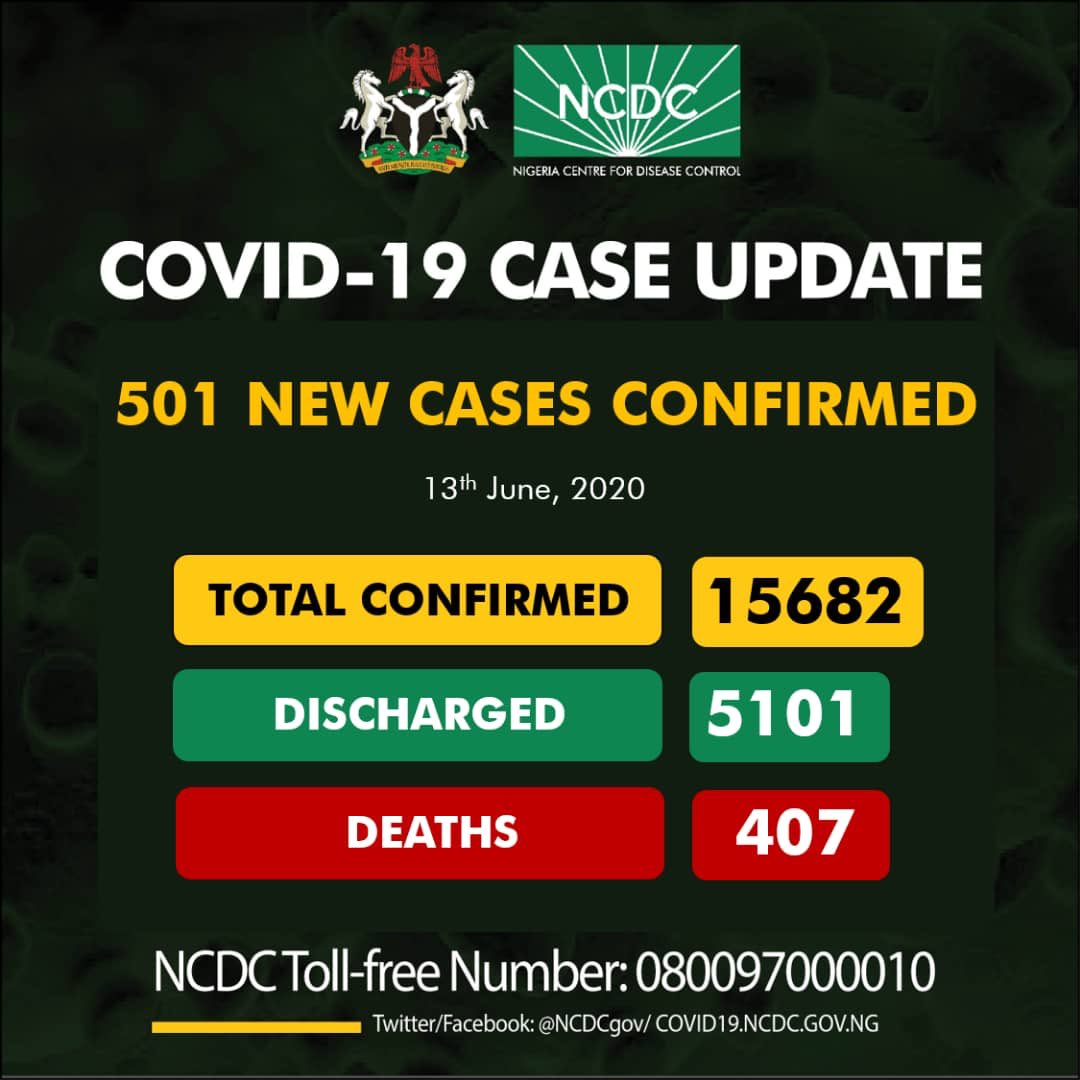Nigeria recorded 501 new COVID-19 cases on Saturday, bringing the total infections to 15,682.
SEE ALSO: JUST IN: President Buhari attends Juma’at service at Aso Villa Mosque
The Nigeria Center For Disease Control (NCDC) announced this on Saturday on its official Twitter handle.
The centre also said that it recorded eight deaths.
The News Agency of Nigeria (NAN) reports that the centre said that no new state reported a case in the last 24 hours.
The health agency said that Lagos State reported the highest number of cases with 195 new cases and the FCT was second with 50 new infections.
Other states with new cases include Kano (42), Kaduna (27), Edo (26), Oyo (22), Imo (21), Gombe (17), Benue (12), Enugu (12), Delta (11), Anambra (11), Ebonyi (10), Nasarawa (9), Ogun (9), Bauchi (8), Kebbi (4), Akwa Ibom (3), Jigawa (3), Katsina (3), Yobe (2), Borno (2), Kwara (1) and Ondo (1).
The NCDC said that out of the 15,682, 10,174 are active cases while 5,101 cases have been treated and discharged.
The centre said Nigeria recorded a total 407 deaths in 35 states and the Federal Capital Territory.
NAN also reports that NCDC has released guidelines to be observed by churches and mosques following the reopening of worship centres by most states in the country.
The health agency noted that the spread of the coronavirus has been attributed to large gatherings by so many countries, therefore there’s a need to follow strict guidelines inorder to curb the spread of the virus.
NAN recalls that the Federal Government relaxed the ban placed on religious settings, allowing faith groups to meet while adhering to public health and social measures on the June 2.
The NCDC, however, noted that in most countries, the outbreak of the COVID-19 pandemic has been linked to large gatherings, including religious and non-religious gatherings.
It therefore advised that religious centres should be clearly marked such that people sit and maintain two metres distance from each other.
It also stressed that activities that encourages direct contacts should be suspended and discouraged. Places of worship should also be disinfected before and after worship.
The guideline released in Abuja further states that: “Following the review of recent restriction measures by the Presidential Task Force, NCDC has developed new guidelines for places of worship in Nigeria. This is to ensure safe gatherings and prevent exposures to COVID-19 infection in religious settings.
“In several countries, COVID-19 outbreaks have been linked to large gatherings, including religious and non-religious gatherings. To reduce the risk of infection in places of worship, NCDC offers the following guidance:
“There should be no entry without facemasks. All attendees and religious leaders must wear a face mask. People who are sick should not go to places of worship. There should be temperature screening on entry.
“Hand washing facilities and hand sanitiser should be provided at point of entries and strategic points.
“Attendance at religious settings should not exceed one-third of sitting capacity, and religious centres should be clearly marked such that people sit and maintain two metres distance from each other.
“There should be no form of direct contact. Practices such as handshakes as peace signs are discouraged. Practices that require sharing of materials should be limited. For example, ablution should be performed at home.
“Religious centres should be disinfected routinely, before and after worship.”

